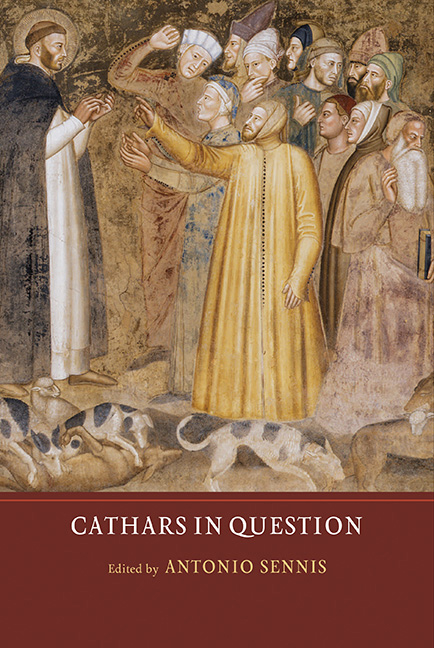Book contents
- Frontmatter
- Contents
- Acknowledgments
- 1 Questions about the Cathars
- 2 The Paradigm of Catharism; or, the Historians’ Illusion
- 3 The Cathar Middle Ages as a Methodological and Historiographical Problem
- 4 The Heretical Dissidence of the ‘Good Men’ in the Albigeois (1276–1329): Localism and Resistance to Roman Clericalism
- 5 The Heretici of Languedoc: Local Holy Men and Women or Organized Religious Group? New Evidence from Inquisitorial, Notarial and Historiographical Sources
- 6 Cathar Links with the Balkans and Byzantium
- 7 Pseudepigraphic and Parabiblical Narratives in Medieval Eastern Christian Dualism, and their Implications for the Study of Catharism
- 8 The Cathars from Non-Catholic Sources
- 9 Converted-Turned-Inquisitors and the Image of the Adversary: Ranier Sacconi Explains Cathars
- 10 The Textbook Heretic: Moneta of Cremona's Cathars
- 11 ‘Lupi rapaces in ovium vestimentis’: Heretics and Heresy in Papal Correspondence
- 12 Looking for the ‘Good Men’ in the Languedoc: An Alternative to ‘Cathars’?
- 13 Principles at Stake: The Debate of April 2013 in Retrospect
- 14 Goodbye to Catharism?
- Index
- Miscellaneous Endmatter
2 - The Paradigm of Catharism; or, the Historians’ Illusion
Published online by Cambridge University Press: 31 March 2017
- Frontmatter
- Contents
- Acknowledgments
- 1 Questions about the Cathars
- 2 The Paradigm of Catharism; or, the Historians’ Illusion
- 3 The Cathar Middle Ages as a Methodological and Historiographical Problem
- 4 The Heretical Dissidence of the ‘Good Men’ in the Albigeois (1276–1329): Localism and Resistance to Roman Clericalism
- 5 The Heretici of Languedoc: Local Holy Men and Women or Organized Religious Group? New Evidence from Inquisitorial, Notarial and Historiographical Sources
- 6 Cathar Links with the Balkans and Byzantium
- 7 Pseudepigraphic and Parabiblical Narratives in Medieval Eastern Christian Dualism, and their Implications for the Study of Catharism
- 8 The Cathars from Non-Catholic Sources
- 9 Converted-Turned-Inquisitors and the Image of the Adversary: Ranier Sacconi Explains Cathars
- 10 The Textbook Heretic: Moneta of Cremona's Cathars
- 11 ‘Lupi rapaces in ovium vestimentis’: Heretics and Heresy in Papal Correspondence
- 12 Looking for the ‘Good Men’ in the Languedoc: An Alternative to ‘Cathars’?
- 13 Principles at Stake: The Debate of April 2013 in Retrospect
- 14 Goodbye to Catharism?
- Index
- Miscellaneous Endmatter
Summary
Catharism was neither a Balkan heresy, a construct of the persecuting society, or, for that matter, even a medieval phenomenon, as it has never existed, except as an enduring invention of late nineteenth-century scholars of religion and history. The historical and epistemological paradigm shaping and guiding research on Catharism for more than a century is moribund. Great (if misguided) scholarship was achieved within this paradigm, including some of the methods and insights now leading to its obsolescence. What distinguishes historians who persist in accepting (and defending) the reality of Catharism is, as Thomas Kuhn argued about scientists wedded to conventional wisdom, ‘how little they aim to produce major novelties, conceptual or phenomenal’. This blinkered competence, where the achievements of older scholars are solemnly replicated, and all new research is wilfully ignored, consistently misunderstood, or vehemently rejected (and, every so often, a curious mix of all three), encourages either a studious treading of intellectual waters, hoping against hope that the tide is not turning, or a learned backstroke to around 1970, although, depending on the current, it is, more often than not, 1870. It is this retreat by many (really, too many) historians recently into earlier academic accomplishments and assumptions, along with a debating style closer to soapbox moralism than scholarly analysis, that, more than anything else, reveals how profound and threatening is the ongoing paradigm shift – for that is what it is – of a Middle Ages without Catharism.
The old paradigm of Catharism was, and still is, shaped by two seemingly incompatible methodological approaches to the past. The first and dominant approach views the study of religion and heresy as an exercise in intellectual history. This intellectualist bias presumes that what defines heresies are coherent theologies and doctrines compiled and disseminated in canonical texts by heretical leaders. Although this bias was implicit in most scholarly research into religion before the late nineteenth century, it was only after 1870 that this idealist inclination was explicitly codified as a method, especially by German academics practising the new Religionsgeschichte.
- Type
- Chapter
- Information
- Cathars in Question , pp. 21 - 52Publisher: Boydell & BrewerPrint publication year: 2016



